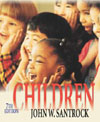John W. Santrock,
University of Texas, Dallas
| animism | the belief that inanimate objects have "lifelike" qualities and are capable of action.
(See 276)
|
 |
 |
 |
| centration | the focusing of attention on one characteristic to the exclusion of all others.
(See 278)
|
 |
 |
 |
| child-centered kindergarten | education that involves the whole child by considering both the child's physical, cognitive, and social development and the child's needs, interests, and learning styles.
(See 295)
|
 |
 |
 |
| conservation | in Piaget's theory, awareness that altering an object's or a substance's appearance does not change its basic properties.
(See 278)
|
 |
 |
 |
| developmentally appropriate practice | education that focuses on the typical developmental patterns of children (age appropriateness) and the uniqueness of each child (individual appropriateness). Such practice contrasts with developmentally inappropriate practice, which ignores the concrete, hands-on approach to learning. Direct teaching largely through abstract paper-and-pencil activities presented to large groups of young children is believed to be developmentally inappropriate.
(See 296)
|
 |
 |
 |
| egocentrism | the inability to distinguish between one's own perspective and someone else's (salient feature of the first substage of preoperational thought).
(See 275)
|
 |
 |
 |
| intuitive thought substage | Piaget's second substage of preoperational thought, in which children begin to use primitive reasoning and want to know the answers to all sorts of questions (between 4 and 7 years of age).
(See 279)
|
 |
 |
 |
| Montessori approach | an educational philosophy in which children are given considerable freedom and spontaneity in choosing activities and are allowed to move from one activity to another as they desire.
(See 296)
|
 |
 |
 |
| operations | in Piaget's theory, an internalized set of actions that allows a child to do mentally what she formerly did physically.
(See 274)
|
 |
 |
 |
| Project Follow Through | an adjunct to Project Head Start, in which the enrichment programs are carried through the first few years of elementary school.
(See 297)
|
 |
 |
 |
| Project Head Start | compensatory education designed to provide children from low-income families the opportunity to acquire the skills and experiences important for school success.
(See 297)
|
 |
 |
 |
| scaffolding | in cognitive development, Vygotsky used this term to describe the changing support over the course of a teaching session, with the more skilled person adjusting guidance to fit the child's current performance level.
(See 281)
|
 |
 |
 |
| social constructivist approach | emphasizes the social contexts of learning and that knowledge is mutually built and constructed. Vygotsky's theory reflects this approach.
283
short-term memory the memory component in which individuals retain information for 15 to 30 seconds, assuming there is no rehearsal. 287
|
 |
 |
 |
| symbolic function substage | Piaget's first substage of preoperational thought, in which the child gains the ability to mentally represent an object that is not present (between 2 and 4 years of age).
(See 275)
|
 |
 |
 |
| theory of mind | individuals' thoughts about how mental processes work.
(See 289)
|
 |
 |
 |
| zone of proximal development (ZPD) | Vygotsky's term for tasks too difficult for children to master alone but that can be mastered with assistance.
(See 281)
|



 2003 McGraw-Hill Higher Education
2003 McGraw-Hill Higher Education